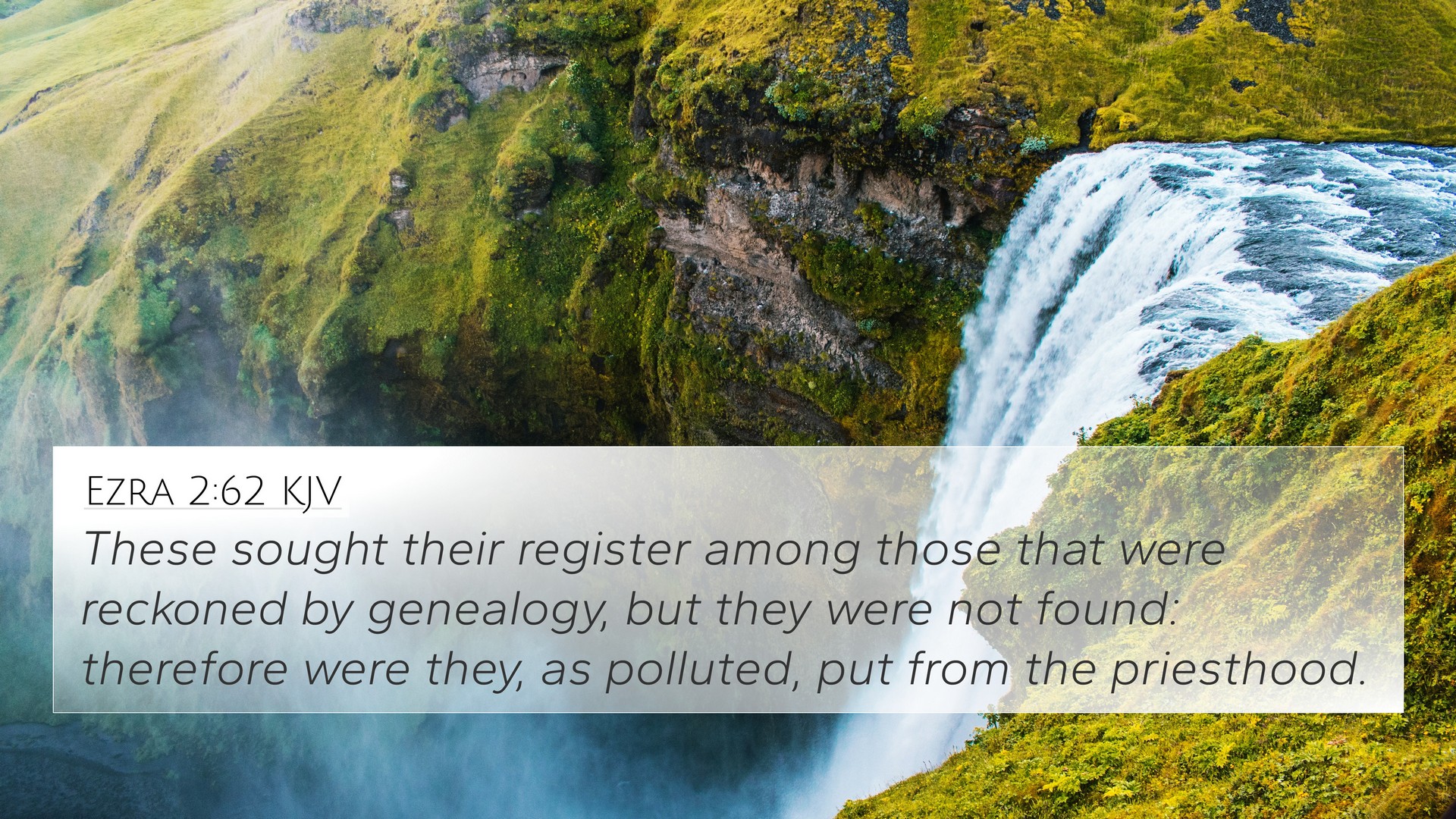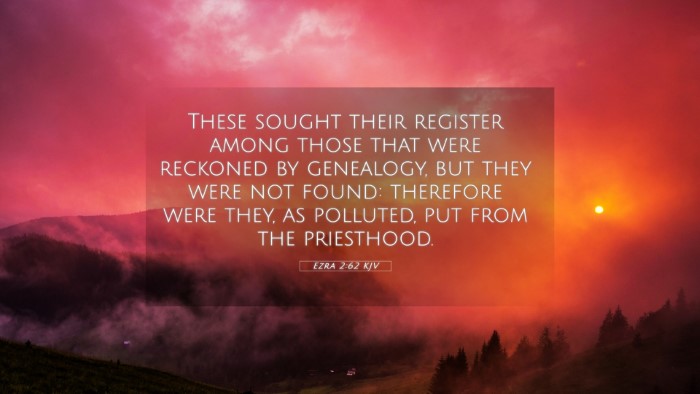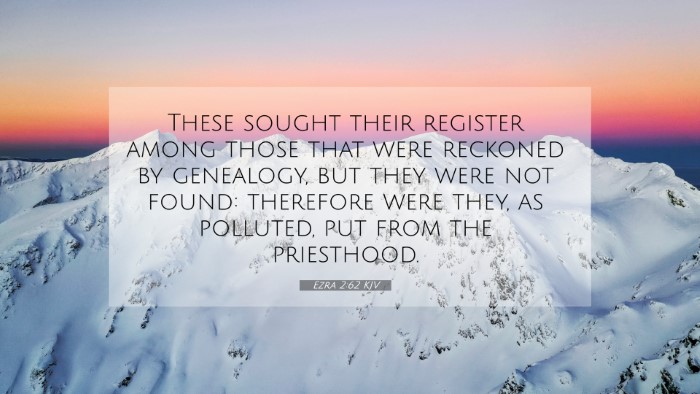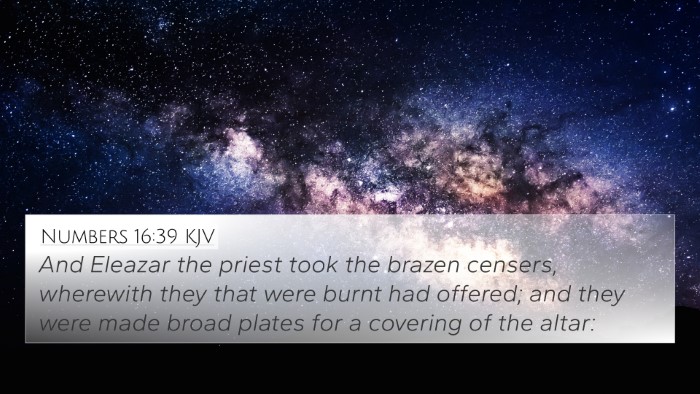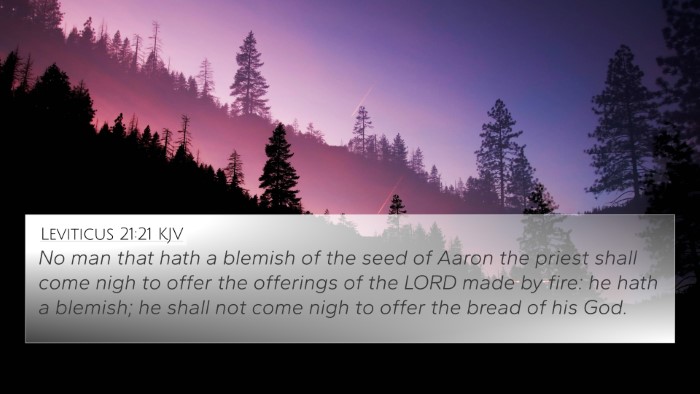Understanding Ezra 2:62
This verse presents a noteworthy moment in the book of Ezra, where it lists those who were unable to prove their Israelite lineage during the return to Jerusalem from Babylonian captivity. The verse reads:
"These sought their register among those that were reckoned by genealogy, but it was not found: therefore were they, as polluted, put from the priesthood."
Exegesis and Context
The context of Ezra 2 involves the return of the Jewish exiles. Ezra, being a priest and scribe, emphasizes the importance of identity and lineage, particularly for priests. This reflects the Hebrew understanding of community and worship whereby legitimacy was tied to ancestry.
Commentary Insights
- Matthew Henry: He emphasizes the seriousness of genealogy in Israelite culture, particularly for those serving in religious capacities. The inability to produce lineage rendered them ineligible for priestly duties, where purity and identity were paramount.
- Albert Barnes: Barnes highlights that the priests and Levites were often scrutinized for their genealogy. This verse points to God's orderly arrangement and how these individuals had disqualified themselves from participating in sacred duties due to the lack of documentation proving their heritage.
- Adam Clarke: Clarke notes that the notion of being 'polluted' refers to ritual purity, suggesting that without proper genealogical proof, one could not serve in the temple. This reinforces the idea that God demanded a certain standard for service in the temple.
Thematic Connections
Ezra 2:62 stands at the intersection of identity, community, and religious obligation within the broader narrative of Israel’s restoration. This thematic concern resonates throughout the Scriptures:
- Leviticus 21:17-21 - Outlines the physical and genealogical qualifications for priests.
- Nehemiah 7:64 - Echoes similar sentiments about those who could not prove their ancestry.
- Matthew 1:1-17 - Presents Jesus’ genealogy, affirming the significance of lineage in God's redemptive plan.
- John 1:47-49 - Highlights the recognition of identity in Christ, showing how genealogy plays a role in understanding the Messiah.
- Romans 11:1-5 - Discusses the remnant of Israel, emphasizing the ongoing significance of Israel's heritage.
- Hebrews 7:14 - Relates Jesus to the tribe of Judah, further weaving importance into genealogical lines.
- Revelation 21:12 - The names of the twelve tribes are written on the gates of the New Jerusalem, indicating the eternal significance of Israel's lineage.
Practical Applications
This verse, while historical, prompts contemporary believers to consider the following:
- The importance of spiritual identity in Christ, as it transcends physical genealogy.
- An understanding of God’s order in community and worship.
- A call to integrity in one’s service to God, recognizing the importance of being 'found' in Him.
Cross-Referencing Biblical Texts
Ezra 2:62 encourages a deeper investigation of Scriptures through the lens of genealogy, covenant, and identity. Below are key cross-references:
- Ezra 2:61: Speaks to the lineage of the priests just before this verse.
- Ezra 2:63: Continues the theme of disqualification and implications for the individuals mentioned.
- Jeremiah 33:17-22: Provides prophetic assurance concerning the house of David and the Levitical priests.
- Matthew 22:44: Points to Jesus’ authority over David's lineage, important for understanding His role as king.
- Acts 4:36: References Barnabas, of the Levite lineage, illustrating the fulfillment of biblical roles.
- 1 Peter 2:9-10: Describes believers as a royal priesthood, emphasizing renewed spiritual lineage.
- Galatians 3:28: Negates ethnic and genealogical barriers in Christ, directing focus to spiritual identity.
Conclusion
Ezra 2:62 serves as a significant reminder of the importance of identity in worship and community. It also opens the door to explore inter-Biblical dialogues and connections between both Old and New Testament themes. To fully grasp the meaning behind this verse, one can utilize tools for Bible cross-referencing, enabling a deeper understanding of how verses interconnect and enhance the overall biblical narrative.
Further Study Recommendations
For those desirous of deepening their bibliological studies, consider employing cross-reference methods using a Bible concordance, or diving into a cross-reference Bible study to unravel thematic connections that transcend the text.
SEO Focus Keywords
- Bible verse cross-references
- Connections between Bible verses
- Cross-referencing Biblical texts
- Comparative Bible verse analysis
- Bible verse parallels
- Understanding scriptural cross-referencing
- Identifying connections between Old and New Testament
